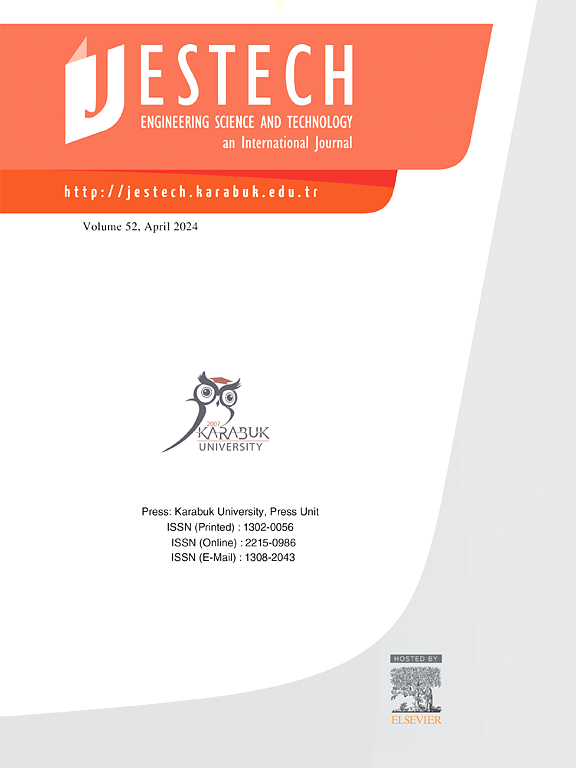Strategic classification of smart city strategies in developing countries
IF 5.1
2区 工程技术
Q1 ENGINEERING, MULTIDISCIPLINARY
Engineering Science and Technology-An International Journal-Jestech
Pub Date : 2025-01-01
DOI:10.1016/j.jestch.2024.101936
引用次数: 0
Abstract
Smart cities represent the forefront of combining technological innovation with urban management to enhance the quality of life and sustainability of urban environments. While existing studies have focused on individual smart city evaluations, there is a notable gap in systematic classification approaches that can handle uncertain and incomplete data in developing countries. As urban populations continue to grow, the strategic integration of smart technologies in city planning and management becomes crucial, necessitating more sophisticated evaluation methodologies. These technologies offer promising solutions to urban challenges by improving efficiency, economic growth, and citizen engagement. This research addresses this gap by proposing a novel framework that combines Interval Valued Neutrosophic Sets (IVNS) with the EDAS Method, specifically designed to handle the complexities and uncertainties inherent in developing country contexts.
The study extensively reviews existing literature and methodologies applied in similar contexts, identifying key limitations in current approaches and building a robust framework that incorporates both new and established criteria. Through the systematic application of IVNS-EDAS methodology across multiple urban environments, this study develops a comprehensive classification system that accounts for both quantitative metrics and qualitative assessments of smart city capabilities. The results showcase a dynamic classification framework that effectively handles data uncertainty while providing clear, actionable insights for urban planners and policymakers. The paper concludes by validating the effectiveness of the proposed approach through a detailed computational study involving diverse stakeholders, confirming its applicability and utility in refining smart city strategies globally, particularly in developing country contexts where data reliability and completeness may be challenging.
The study provides specific policy guidelines for each city classification, offering policymakers a structured framework for resource allocation and strategic planning, ranging from foundational infrastructure development in emerging cities to advanced technology integration in metropolitan areas.
求助全文
约1分钟内获得全文
求助全文
来源期刊

Engineering Science and Technology-An International Journal-Jestech
Materials Science-Electronic, Optical and Magnetic Materials
CiteScore
11.20
自引率
3.50%
发文量
153
审稿时长
22 days
期刊介绍:
Engineering Science and Technology, an International Journal (JESTECH) (formerly Technology), a peer-reviewed quarterly engineering journal, publishes both theoretical and experimental high quality papers of permanent interest, not previously published in journals, in the field of engineering and applied science which aims to promote the theory and practice of technology and engineering. In addition to peer-reviewed original research papers, the Editorial Board welcomes original research reports, state-of-the-art reviews and communications in the broadly defined field of engineering science and technology.
The scope of JESTECH includes a wide spectrum of subjects including:
-Electrical/Electronics and Computer Engineering (Biomedical Engineering and Instrumentation; Coding, Cryptography, and Information Protection; Communications, Networks, Mobile Computing and Distributed Systems; Compilers and Operating Systems; Computer Architecture, Parallel Processing, and Dependability; Computer Vision and Robotics; Control Theory; Electromagnetic Waves, Microwave Techniques and Antennas; Embedded Systems; Integrated Circuits, VLSI Design, Testing, and CAD; Microelectromechanical Systems; Microelectronics, and Electronic Devices and Circuits; Power, Energy and Energy Conversion Systems; Signal, Image, and Speech Processing)
-Mechanical and Civil Engineering (Automotive Technologies; Biomechanics; Construction Materials; Design and Manufacturing; Dynamics and Control; Energy Generation, Utilization, Conversion, and Storage; Fluid Mechanics and Hydraulics; Heat and Mass Transfer; Micro-Nano Sciences; Renewable and Sustainable Energy Technologies; Robotics and Mechatronics; Solid Mechanics and Structure; Thermal Sciences)
-Metallurgical and Materials Engineering (Advanced Materials Science; Biomaterials; Ceramic and Inorgnanic Materials; Electronic-Magnetic Materials; Energy and Environment; Materials Characterizastion; Metallurgy; Polymers and Nanocomposites)
 求助内容:
求助内容: 应助结果提醒方式:
应助结果提醒方式:


